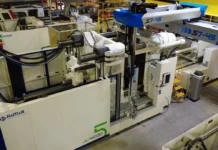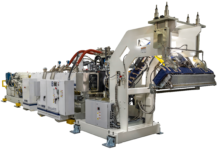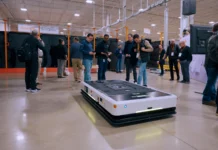Press release submitted on behalf of Wittmann USA.
Medical giant Eli Lilly & Company has donated a Wittmann Micro Molding Work Cell to the University of Massachusetts Lowell. The work cell, which consists of a MicroPower molding machine and two-shot mold, robot, dryer, temperature control units, and feeders, will be used by students in the university’s Plastics Engineering program for research and development of micro-parts manufacturing.
A reception and ribbon-cutting ceremony at the Saab Center on the UMass Lowell campus was held on Thursday, April 11. Executives from Lilly, WITTMANN USA, and UMass Lowell faculty, students and administrators were on hand to celebrate.
As part of the collaboration between Wittmann and Lilly, Wittmann took the machine back to its US headquarters in Torrington, CT and performed numerous upgrades to the machine. This included adding new end-of-arm-tools, writing new software programs, starting up and training UMass Lowell operators on the use of the machine.
David Preusse, WITTMANN USA President, and Dr. Ho-Seon Jin, Lilly Senior Director-Engineering, both UMass Lowell alumni, spearheaded the project, as did Davide Masato, Assistant Professor of Plastics Engineering at UMass Lowell. After the ceremonial ribbon-cutting, they all spoke to the attendees.
Video of Ribbon-Cutting Ceremony with Short Speeches
In addition to applauding the collaboration between everyone involved at Lilly, Wittmann and UMass Lowell to bring this new micromolding work cell to the university, Preusse pointed out in his comments that this was Wittmann’s second major donation to the UMass Lowell Plastics Engineering Program. In 2016, the company donated a Wittmann 4.0 Molding Work Cell that consisted of an injection molding machine, robot, and auxiliary equipment including temperature control units, a conveyor and a granulator. That system continues to be used extensively by students for hands-on injection molding research and development.
“We are thankful that the work cell we donated in 2016 has led to courses in Robotics & Automation at UMass Lowell,“ he said. “Students love the hands-on aspect of designing plastic parts, molds, robot end-of-arm-tooling, and then seeing it all come together when they run an automated plastics production molding cell.“
“We all know about the ongoing problem with the worker shortage in our country, and our industry,“ he continued. “It is our hope that this new work cell will help the university continue to develop more career-ready graduates with both the engineering and hands-on experience to enter the plastics industry and make an immediate impact.“
Dr. Jin mentioned Lilly’s original use of the Wittmann MicroPower machine, and how he had hoped to find a way to donate the machine to his alma mater after it was no longer in use. “I came to this country many years ago, and am proud of my roots and the education I received here at UMass Lowell,“ he said. “After being involved in the original use of this Wittmann micro molding work cell, I am thrilled on behalf of Lilly to be a part of this donation to the university. UMass Lowell means a lot to me and I hope this helps the university continue its great work to develop talented engineers for the plastics industry.“
Davide Masato had a unique career path that led to the event. He first worked with a Wittmann MicroPower machine while studying mechanical engineering in Italy, and continued working with them while attending graduate school at the University of Bradford in the UK. Masato came to the US in 2018, accepting a position as Assistant Professor at UMass Lowell in the Plastics Engineering Department.
“This machine will be used for advanced research and manufacturing here at the university, and will be used by both undergraduate and graduate students,“ he said. “We also plan to continue our professional development work, and this machine will be part of educating plastics industry professionals on best practices for micromolding.“
Comments from Davide Masato at UMass Lowell Ceremony
Micro Molding Applications Continue to Grow
The use of micromolded parts continues to grow, with the medical market being one of the primary drivers of that growth. Wittmann MicroPower machines are being used to mold products out of bio absorbable materials including parts used in heart and other surgical procedures, diabetes devices, and more. Also, the fast-growing Auto Injector Drug Deliverable Device sector has led to the need for even more tiny plastic parts.
Micromolding is a complex process that includes many variables, said David Preusse. Usually the plastic materials in these applications are expensive, so minimizing or eliminating the runner and/or sprue and decreasing cycle times is important, all while maintaining the critical part features and dimensional tolerances. Adding multi-component materials and functions such as automation, vision inspection, and cavity traceability increase the complexity.
“This field requires the brightest minds and most capable and innovative technology,“ said Preusse. “It’s another example of how critically plastic contributes to our lives. We’re proud to be a part of this industry, and proud that plastics helps save lives.“
Recent Developments at UMass Lowell
The Wittmann/Lilly donation was part of a two-day event at UMass Lowell that included a Chancellor’s Luncheon, and an Industrial Advisory Board Meeting, where UMass Lowell presented information on recent developments at the university.
The ambitious projects that UMass Lowell is undertaking include managing upwards of $150 million in grants, up from just $5 million in 2014. The university is actively wokring to increase student study options in emerging technologies, including additive manufacturing and others. In addition, the potential of major private developer investment in the community was discussed, which may include adding more affordable and accessible housing and working environments, and imporeved infrastructure throughout the city of Lowell.
Recent rankings by payscale.com show that UMass Lowell is:
- 1 in New England for return on investment among public universities
- 1 for 20-year return on investment among public universities
- 1 for mid-career salary among New England public universities
UMass Lowell’s continued focus on guaranteeing paid career-connected experiences for all students is a key factor in achieving these results.
About WITTMANN
With headquarters in Vienna, Austria, WITTMANN is a global company with 7 production facilities, 31 subsidiaries, and 24 agencies in 52 countries. WITTMANN is the only manufacturer offering plastic processors worldwide a complete range of innovative robot automation and injection molding machine technology, along with auxiliary equipment for material conveying, blending, drying, granulating, heating and cooling, for individual work cells to fully integrated project managed system solutions from one manufacturer. Their worldwide sales and service network provides unmatched local service and support.





